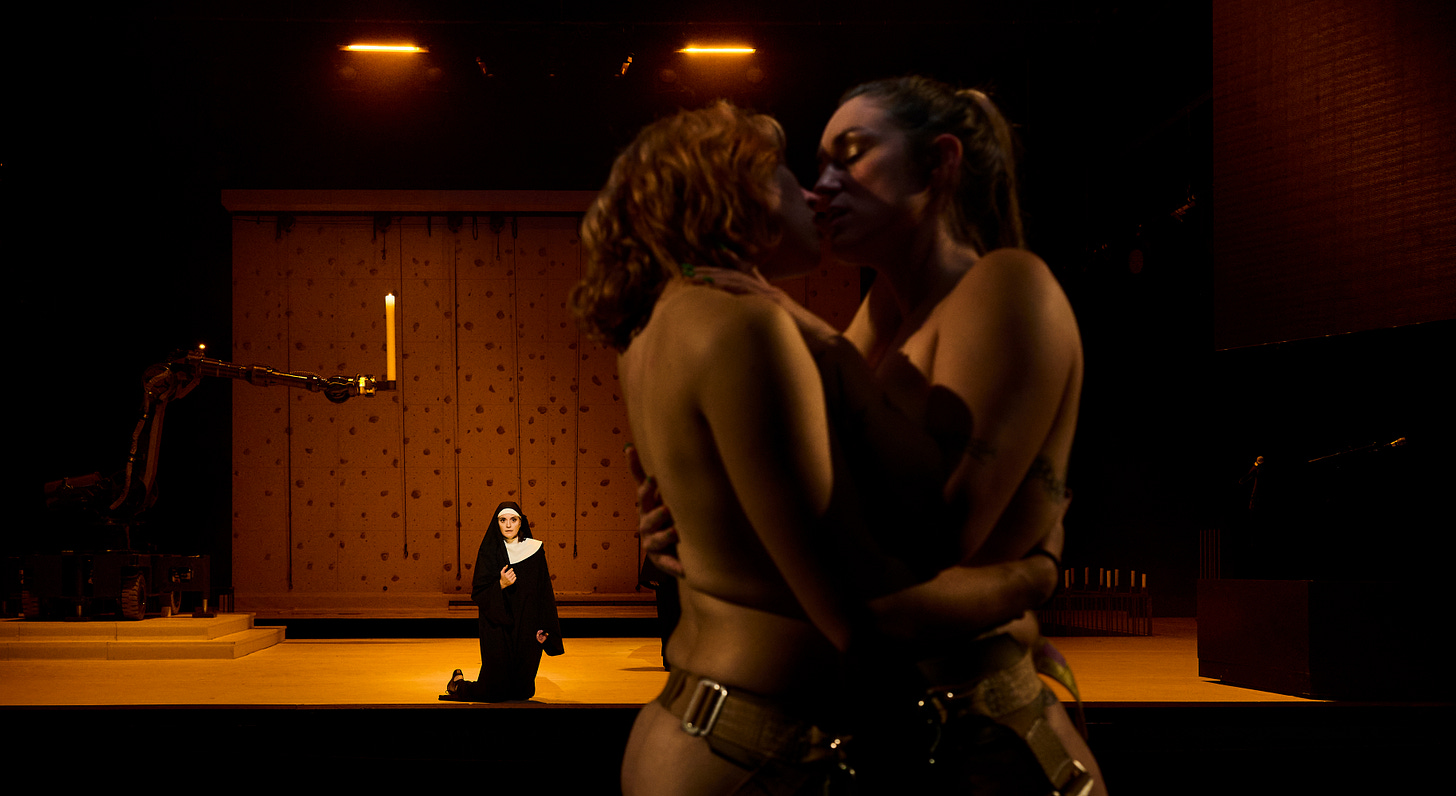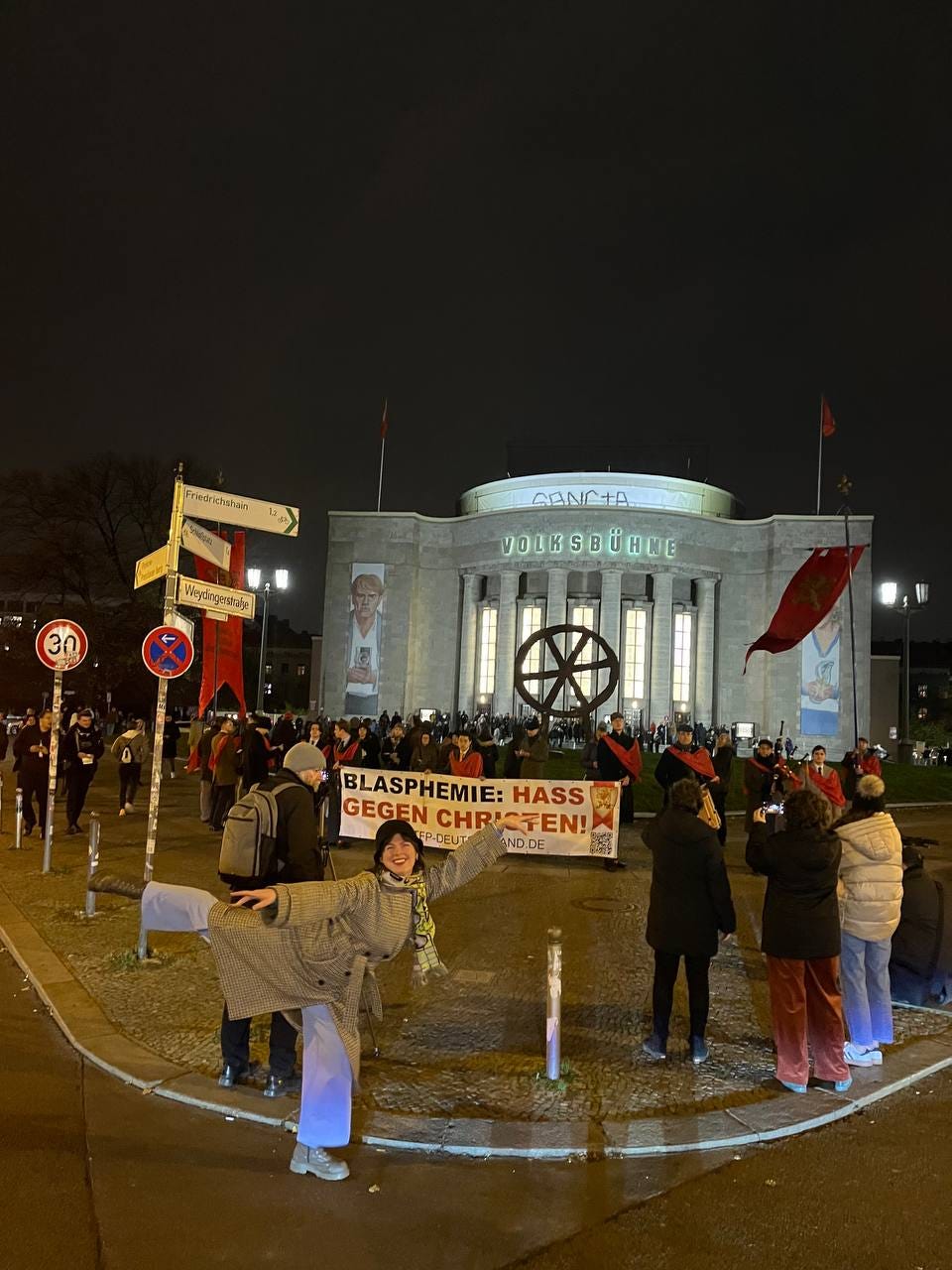Trauma + Sancta by Florentina Holzinger
special edition
Two performers wearing only climbing harnesses enter the theater from the back. Paul Hindelmith’s opera Sancta is underway, and in the lyrics, the lustful Susanna cries to her sister to close the window, the chill of which (God’s stern and ever-watchful eye) terrifies her to the bone. The two performers, Jasko Fide and Netti Nüganen meet downstage and kiss, bending their legs so as to better press themselves into one another. They turn from each other and walk the perimeter of the Volksbuhne stage and meet at the back, at the bottom of a climbing wall, where they go. at. it. Finger-banging, hair pulling, humping and slapping in that fast and enthusiastic way so dear to lesbians, the hums, drawn breaths, and groans of which become audible at each dramatic pause in the ongoing opera downstage.
Ten performers slither out of a pit in the ground and start climbing the wall. A gigantic cross is lowered from the rafters. The two performers engaging in the sex act hook their harnesses onto the cross’ safety rig, climb it to its junction and mount a small perch, where they carry on with screaming oral. The climbers in the background are now hanging with arms extended and legs together in crucifixion. The soprano, played by Cornelia Fink on the evening I went, is hysterically getting undressed. A 40-person choir of nuns is now onstage, surrounding her in songs of shame. I am in the audience, sitting next to my friend’s Italian father, hands covering my open mouth. I have been sitting in the theater for 20 minutes, and there are 130 more minutes to go.
Transcendent experiences of this caliber will happen three or four more times in Sancta, the latest work of Florentina Holzinger. They feature stunts you have probably read about elsewhere, like nuns naked from the neck down rollerblading on a half-pipe, suspension, cannibalism, a remixed macarena of catholic gestures, as well as some really beautiful dancing.
The dramaturgical need to give the peaks their valleys was met in quiet moments, during which the performers would gather, perhaps while Xana Novais’ flesh was getting cut out, or around a long table à la last supper, and share personal stories about their experiences with the church.
These moments were confessional in tone and texture. The delivery of the text was as nuanced as slices of white bread, emotion spread atop them in slathers of unsalted margarine. The words were innocuous, like Renée Copraij saying, and I paraphrase, “I told my mother that I didn’t believe in God when I was a child, and then she told the priest. I was so embarrassed.” Even in stories in which the church was more abusive, like when a church community had gone behind a survivor’s back and told the police to drop rape charges, the outrage was subdued, punctuating the air and then sadly flopping to the ground. I felt that the stories rested on a unified set of assumptions: that none of the performers would still participate in church now and were more empowered for it, and that the church, whatever that is to them, is a site of repression and violence, which they sat diametrically opposite to.

I haven’t written since writing my last newsletter about getting scammed in October. The speed at which I transformed an experience into a newsletter was alarming: one week after the event, I pressed send. I have made a few attempts to write since then, but for one reason or another, none of them coagulated into a text I felt good about. Small breaks are supportive for any artistic practice, and 5, 6, 7, 8 was ripe for one. In the meantime, I have been thinking about trauma a lot.
In my last newsletter, I used the word traumatic to describe my experience of the scam. I thought I had made it clear that I was using trauma as a word that is relative, that for example losing 1000 euros, as I did, is not as traumatic as losing your pension. I used the word because scams are an act of violence in which you have little or no control over your actions, because your worldview is shrunken by your scammer, and being so disoriented by the sudden powerless situation you find yourself in, in which you are made to believe you are being helped, you have no choice but to hand over your resources to the criminal who is exploiting our beautiful capacity to trust strangers. Many people are so ashamed of their scam, ashamed they could be so stupid, that they never speak about it. I described what happened to me as traumatic in hopes that it would let air into the room, allow others to name their trauma, because I think this kind of acknowledgement was the first step to healing. I also described what happened to me as traumatic because it seemed to be a big enough word, a clear enough word, to define an event that was very harmful and did not break me, and whose most startling attributes were the disorientation I felt at this sudden extraordinary event.
I met some resistance in response, some of it soft and invested in growing together, some of it annoying and policing. To all forms of resistance, I was outraged. It felt like something was being taken from me. You can tell you are attached when you need others to participate in your trauma by validating it, and that it feels threatening when they do not. When others do not confirm the narrative that the trauma has created, even if they are otherwise being supportive, it can feel like an attack on your identity. I was grateful to be reminded that calcified attachments to trauma make us brittle, and that I do not want to be in a place in which questions and honest criticism make me want to explode.
A month or so ago I walked all the way down Bernauerstraße with a close friend, and as we made our way down the length of the street, one thing led to another, and they ended up asking me why I didn’t consider the clumsy, shitty, inebriated straight sex I had in college to be traumatic. As we discussed it, I felt the urge to connect with my friend, and I didn’t want to be avoidant, or appear to be avoidant, of pain. I ended up acquiescing that there may indeed have been trauma involved in college sex, and even though I didn’t feel like trauma was the right word, it did feel healing to acknowledge the ways I did not protect my body when I was 20.
Take a cute moment like that and extrapolate it to the wider world I navigate, where the word trauma is widely operationalized, and I fear you get people who are less sovereign, who build unhealthy bonds that rely on brittle narratives. How people present themselves, their hair, their words, the way they use money, the way they are insecure in bed or at parties, all these behaviors can be grounds for using the word trauma and are also probably informed on some level by traumatic experiences. The more we give trauma the front seat, the harder it is to have conversations with the passengers in the back seat. The way trauma gets highlighted can create social cleavages in that it gets used to feed that great (white supremacist) lie that is individuality, specialness. The outrage I felt when my use of the word trauma was criticised was disproportionate to the shock of actually getting scammed. It felt nice to connect to others on the slip n’ slide of that word. But what word to use to describe the traumas that cannot be metabolized into a newsletter?

In one of Holzinger’s previous works, Ophelia’s Got Talent, which analogizes sexual violence and climate disaster between stunts, there is a delicately wrought scene around a pool in which a performer shares the story of their assault. The other performers are elegantly composed around the speaker, humming or singing, holding space in the water, while a key is extracted from the speaker’s vagina. This kind of dramaturgical consideration was missing for me, in the low-energy moments of Sancta. The disparity between the quality of the low-energy moments in the two works made me think that to Holzinger, it is more fitting to approach sexual violence with earnest dramaturgical sobriety than it is with the violence of Christianity. Yet, both are equally as violent, right? And for a European stage piece such as this one, both constitute the fundamental traumas endemic to this place and its history.
It seemed at times like the whole religion thing was a bullshit conspiracy cult we are going to parody. Yet the program text said this show is an act of reclaiming. Reclaiming which parts? I would not want to reclaim some of what I saw on stage, like the ominousness, the self-flagellation, the manipulation of the crowd, and an obscene, obtuse, and oblivious rendition of Jesus who beats his lamb to death in a cloud of vape smoke. It’s hard to reclaim something publicly if the audience doesn’t know what was lost or taken.
I get that so much of the church is pageantry, and that pageantry lends itself to a different tone. My friend from a Catholic country, like Holzinger’s Austria, said that scandal is dear to Catholics. Scandal is sin, and sin is a public affair. You confess your sins up publicly, so that they can be held by the crowd, and then everyone can relax. If you give up your relationship to Catholicism, then you are also losing your entitlement to scandal, to sin. Wow, I thought, so this means that if you disavow Catholicism, there is no catharsis possible, and catharsis is why we go to the theater. Holzinger’s (sometimes literally) orgasmic crescendos are essentially and phenomenologically scandalous. It is why they work so well.
So it does make sense to ham it up, to let the Paul Hindemith opera slide into the Jesus Christ Superstar musical. But, like rape, the church affects all of us, and the violence in question is serious. At the end, a giant inflatable UFO appears and someone gives a motivational speech about big clit energy incarnate, and I thought, wow you are really missing the point. What is the point? It may be to do what Florentina is good at doing, which is pull off the moments that produce the marvel, the smiling through tears, soul briefly aflame, that I can liken to experiences of witnessing God’s awesomeness.

As I rode my bicycle to the library, I listened to a podcast called the “Magnificast,” about Christianity and leftist politics, which Olympia Bukkakis recommended. White evangelicals in the United States were the subject of the episode I listened to, and a book called “Against” by XX. I have been thinking a lot about dramaturgies that facilitate an encounter with the divine, and how I want to grip the reins of those dramaturgies and show the world how they work. It’s not that I want to them so that I can give people access to the God I believe in. It’s more that as a means of production of the divine, they affect what Maria Scaroni calls the meta-mind, or the part of us that invented, is always inventing, and re-invents God. I want to expose these means of divine production so that people can curate their beliefs better.
Anyways, the evangelicals and fundamentalists of all religions are famously great manipulators. Like scam artists and abusers, they create a chaos and danger happening elsewhere, and that helps their flock remain in the cage, helps them deny climate change and send their children to torture camps known as conversion therapy. The dramaturgy of an evangelical service is not very far away from that of a Peaches concert – lights, music, vibes, libidinal energy. I’m riding my bike, and as I ponder investigating this more deeply, I suddenly get really scared. I think to myself, fuck, what if I do that and get totally disgusted with the whole thing, then I stop believing in God altogether?
The idea of losing such an important part of me is really scary. But, considering all I’ve learned about trauma recently, does the fact that I connect it so deeply with my Identity mean that this part of me is trauma? My faith is so bound to where I come from, and is a big part of who I am. I love that part of myself. Yet the more I learn about religious history, colonialism, and white supremacy, the more I see how much those things overlap with my white religious upbringing.
I prepare to let go of some parts of myself that I have held to dearly. I try to be very precise. It makes everything harder and slower but it’s worth it.
I have no idea how Florentina feels about all this, but I would be curious to know. The friend who talked about the scandal and Catholicism said that for her, the spirituality part of Sancta, the part that is getting reclaimed, is the transcendence that happens in these high-frequency, depth of image, hanging from my skin, totally embodied moments of high-energy ecstasy. I think I felt the same. I mean, I was literally in tears.
An author I love, Meaghan O-Gieblyn, grew up evangelical and seeks to find footing as a non-crazy Christian in her book of essays “Interior States.” She describes liberal friends arguing about the definition of the word morality after disagreeing about vegan ice cream at a farm-to-table restaurant in Milwaukee. She is happy to not be trapped in the violence of her childhood church, but longs, desperately, for a shared paradigm, or a “coherent ideology” that holds us together. In so many ways I relate to that longing, that desire for shared experiences. Maybe the point is that I wanted to connect with Holzinger’s relationship to religion, to the reclaiming parts of it and disavowing others, and instead I was confused.
I wish us all a happy new year and want to thank you for reading this new year’s extra thick edition of 5, 6, 7, 8. Please share it and send it around, and of course, please tell me what you think, push against me, connect with me about your experiences.
Love,
Louise
PS: IMO the cannibalism part was worth it for the “fingering the side wound” reference that happened as a consequence
Thank you Soph Kahlau, Layton Lachman, and Sarah Parolin for the editing and support.
The Announcements Section…
… will be a little different this year. It feels so inane to write about dance and god, both of which are political, but only relatively in this time of genocide, censorship, and revolution. So I will try to not just use the space to advertise the projects I or my friends have going on, but also to send you references and tools for learning. Here are a few things for now!
Nan Goldin’s full speech at the Neue Nationalgalerie.
“Bound Up” by Leora Friedman, an excellent auto-theoretical book written about, among other things, Nazi kink from a Jewish perspective. Thanks, Sam Hertz.
“Margery Kempe” by Robert Glück, which is two love stories (one homo, one between the first memoir-writer in history, Margery, and Jesus) that swim next two each like fish racing downstream. Thanks, Fjóla Gautadóttir.
Buy your books at Ivallan’s Second-Hand & Exceptional Books on Schönleinstr. It has a huge section of books written by writers from the Arab world, a massive selection of queer novels, a lot of random gems, and entire shelves devoted to babes like Ursula Leguin, Clarice Lespector, Octavia Butler, Gertrude Stein, and Audre Lorde. It’s right around the corner from She Said and is often cheaper!
These two links Asaf Aharonson sent me, one about Trump saying he’ll impose sanctions on the ICC, and the other about Germany defunding Israeli groups that are critical of the government.



Heavy Metal Babe… Can’t wait to catch up, xxx